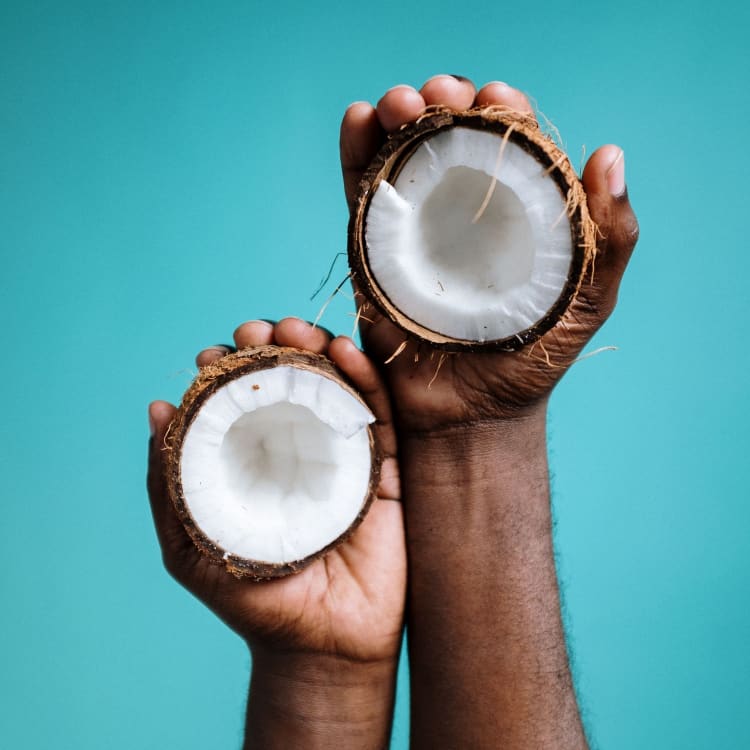An Overview of Coconut Oil Remedies
Coconut oil is a fascinating example of how natural substances work within the human body and digestive system. Today, Gococonutoil.com will share with you some coconut oil remedies (that you may not know yet)
While coconut oil heals our skin and we see clear evidence of that in upcoming portions of this chapter, it is the monoglycerides created within our digestive tract as it breaks down the coconut oil’s triglycerides that provide the anti-microbial effects, killing off pathogens such as Candida albicans.
As we’ve seen in earlier chapters the lauric, caprylic and capric acids are powerhouses of anti-fungal, anti-microbial, anti-protozoal and parasitic action.
Coconut Oil and Giardia
Coconut’s powerful yet completely-safe-to-humans, totally natural fatty acids can kill the Giardia protozoa found in fresh water streams and lakes around the world, and have been shown to have the power to expel tape-worms.
Cures Head Lice Better than the most Popular Commercial Remedy
In another study, coconut oil combined with anise spray proved “significantly more effective” than the leading consumer pediculicide at killing head lice. While the bestselling commercial remedy, Permethrin 0.43% lotion is still 42% effective; coconut oil and anise came in at a whopping 82% effectiveness at curing the condition.
Eliminates the Need for Toxic Petroleum Based Skin Care Products
This is not the only instance where coconut has proven more effective than standard pharmacological and chemical remedies.
In the areas of skin care in particular, coconut oil is healthier, eliminates the use of petroleum products (known to cause tumors and leave toxic deposits in fatty tissue and internal organs) and actually demonstrates the ability to heal at multiple levels in multiple ways. This makes sense when we understand the underlying function of the MCT’s in normal biological processes.

Clearly these essential fatty acids and their triglycerides are extremely important elements of our diets when it comes to retaining good health; but more and more research suggests they can be astonishingly beneficial when used topically, as well.
- You can easily learn how to make skin care from coconut oil at home HERE.
- Check out the Remedies category for more inspirations.
Improves Brain Function
With knowledge of MCT oil nutrition facts, the MCT’s in coconut oil have demonstrated the ability to help our brains to function better and there is clinical as well as direct anecdotal evidence that MCFA’s and their triglycerides assist directly in brain function.
More long term research into the role of MCFA’s and MCT’s in ketonic diet and its role in such diseases as epilepsy have also shown the benefits of these special compounds to human brain health.
Interestingly, as the debate over coconut oil as a healing treatment for Alzheimer’s continues, the evidence has been coming in for a decade now that the triglycerides in coconut oil improve brain function in aging humans and in Alzheimer’s patients. A 2004 study cited in the journal Neurobiology of Aging demonstrated almost immediate improvement in cognitive function in adults with memory disorders given a drink containing emulsified medium chain triglycerides, the primary fat type found in coconut oil.

Not only is this research now a decade old, but the trials themselves were conducted in research leading to the production of a ‘medical food’ named Axona a refined form of the MCT’s tested in the study. Axona, coincidentally, was approved by the FDA in 2009. It is hard to argue that the coconut MCT’s used in the study and isolated for the production of a ‘medical food’ are ineffective! (Company: Accera; Approval Status: Approved March 2009; Treatment Area: Alzheimer’s disease)
The medium chain triglyceride caprylic acid crosses the blood-brain barrier. It has been found to have anti-convulsant in addition to ketogenic effects. This strongly suggests that coconut oil likely does have neuro-protective effects on the human brain.
Research is ongoing; but to suggest that there is not yet enough evidence, especially in light of new pharmaceutical products based on the active therapeutic components found naturally in coconut, seems ludicrous.
And this is just one small area of application, albeit one which has generated a great deal of noise and controversy. But in a world controlled largely by political and moneyed interests it is not so surprising that a lowly coconut, which cannot be patented, or controlled, would not be seen as worthy of our attention.
Either way, the scientific evidence is clear, and coconut oil is not the mythical unicorn of modern medicine, but the latest example of sound evidence that the natural world is abundant with useful and health improving compounds waiting for us to comprehend and utilize them.
What is the difference between coconut oil and MCT oil?
MCT oil can actually be derived from coconuts, but it is a much more concentrated compound when compared to coconut oil.
Protects our Skin from Toxins
Our skin is our second largest organ, following only our gastro-intestinal tract or GI system. Both have direct contact with our environment, our skin through everything around us, and our GI tract through everything we ingest.
It is said that whatever we put on our skin enters our blood stream within 20 seconds. But the truth is a little more complex. The rate and amount of absorption of any substance by our skin is based on two factors: the nature of the substance and what type of skin it comes in contact with. Obviously, the skin on our faces, underarms, and other areas of soft tissue (particularly mucous membranes) are more direct pathways, than say, the soles of our feet. But regardless of the variable rates of absorption of toxins, we can pretty well count on the fact that if we get them on our skin, they are going in.
In the case of coconut oil or any coconut products, for that matter, this is good news. Coconut oil is a great addition to our skin because it is also a great supporter and healer of the skin, living tissues and our blood.
Perhaps most shocking in this age of new revelations about the myriad chemicals which have flooded our skin care and body care markets, is the emerging evidence that so many of these chemical ingredients are actually dangerous to our health and well-being. It’s been proven that parabens, mineral oil and other petroleum-based products collect in our tissues and some have even been shown to produce tumors in laboratory animals.

These petroleum based substances enter our lymphatic system through our skin and are deposited in our internal organs and body fat.
Our bodies are flooded with these known toxins through our own application of commercial body care products on a daily basis. It is considered perfectly ‘normal’ in this modern consumer age to have multiple products we apply to our skin daily.
Perhaps a wiser alternative is to approach our skin and all parts of our body from the point of view that anything we put on it we are putting in it: if we don’t want to eat it, we probably should not be putting it on our skin.
This idea takes on a certain urgent poignancy when we realize that our skin, unlike our digestive system, has no master gate keeper to offer us protection. Anything we eat must first pass through our liver where it can be filtered and removed, before it can enter the blood stream or be deposited in our bodies for long term storage. Our skin has no such gate keeper. Whatever we put on it will make its way into our body, the only variable is how long it will take.
The good news is the remedy is easy.
Coconut oil is a natural healthy substance with no toxic side effects and is more effective at healing dry skin than mineral oil (which is one of the substances shown to build up in internal organs and fat deposits in our bodies). So we can avoid the toxic buildup of petroleum products in our bodies and achieve superior moisturizing of our skin at the same time.
Moisturizing and Healing: Skin and Wound Repair
Coconut oil is great for general moisturizing of dry skin and works wonders on chapped lips, dry chapped hands and any place skin is reacting to dry winter air. When skin becomes dry and rough it loses its natural protective barrier of fatty acids and moisturizing lipids and collagens.
Coconut oil has been conclusively shown to improve the function of all the layers of cells in skin repair and wound site healing. It has also been shown to be effective in assisting the skin in healing burns. 5 Three mechanisms identified in the unique properties of coconut oil are:
- Its ability to accelerate re-epithelialization, which is a wound healing response in the epithelial cells which ‘crawl’ over the surface of the wound and cover and protect it while the wound heals.
- Its ability to improve antioxidant enzyme activity, which allows the wound site to repair more quickly, and
- Stimulation of higher collagen cross-linking within the wound site where the tissue is being repaired.

Coconut oil has even been shown to work synergistically with traditional treatments, including such substances as silver sulfadiazine in speeding recovery of burn wounds.
Coconut oil rebuilds collagen and replenishes critical healing fatty acids as well as providing its inherent anti-bacterial and anti-microbial defense, helping to protect against sores and infections which can erupt from lesions in the skin.
Reducing inflammation and increasing the body’s immune function, the MCFA’s in coconut oil penetrate the skin and can heal the sub-derma layers of cells and capillaries as they make their way deeper into the tissues.
Rashes and Other Skin Irritations
Many rashes are caused by yeast, bacteria or other imbalances which can be brought about by food allergies, exposure to air borne or plant allergens or bacterial or viral infections.
Coconut oil is particularly effective at helping soothe these types of rashes because the lauric, caprylic and capric triglycerides in coconut oil excel at breaking down and destroying bacteria and viruses which are lipid or fat based.
Check out next post about essential oil recipes!
Originally posted 2020-06-10 16:19:39.


My place has a lot of coconuts but I only understand about its benefits when reading your website. Kudos!